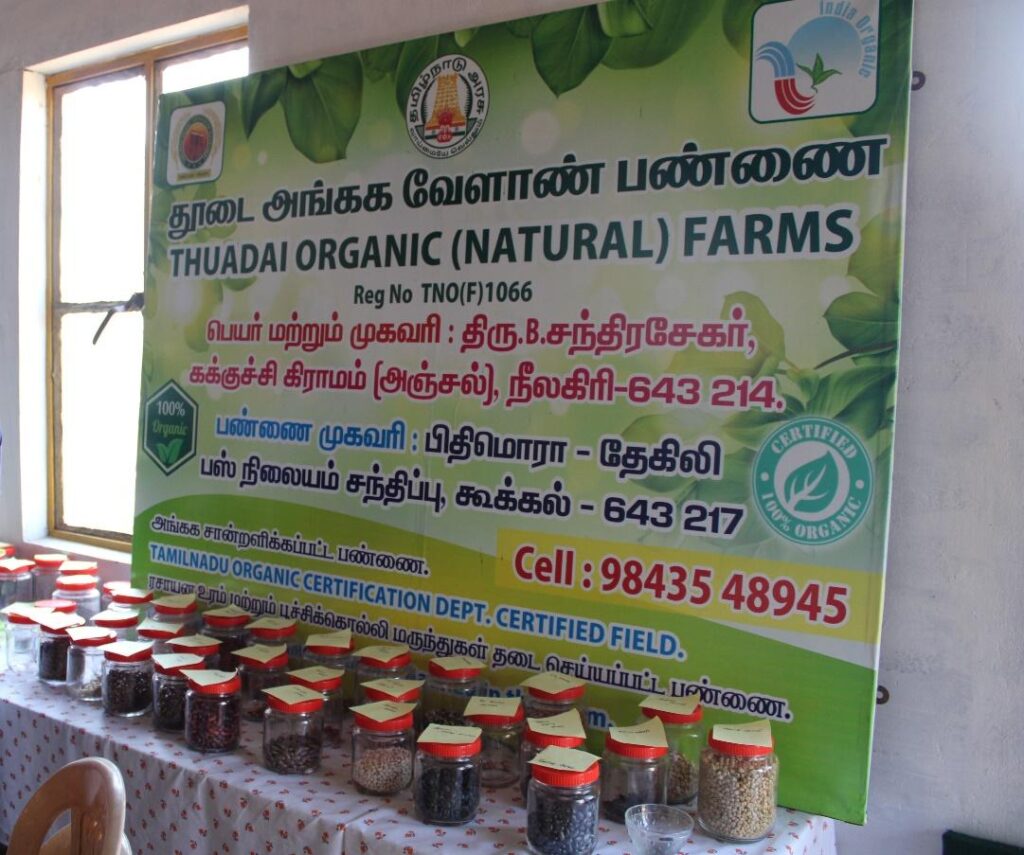Here’s some good news from Kookalthorai Valley. As a first step towards setting up a Farmers Field School, Keystone Foundation hosted a traditional seed festival in Kookalthorai in collaboration with Thuadai Organic Farm school. Some of our active seed savers/seed keepers, farmers, fellows, youth etc from the Nilgiris Biosphere Reserve participated in the event.
The team at Keystone, in consultation with the owner of Thuadai Organic Farm, Chandrasekar planned to set up an exhibition for the visitors and facilitate a seed exchange. Thuadai Organic Farm is the first certified organic patch of land in the Nilgiris. With the help of Naresh, a young farmer who helps Chandrasekar in the farm, we started cleaning up the space for the event.
The People and Nature Collective team at Keystone sorted all the interesting photographs and posters from our work with the farmers in the Nilgiris Biosphere Reserve and displayed them on the wall. The photos and posters spoke about the cultivated and uncultivated food in the Nilgiris, traditional farming practices and methods, tools and techniques, seed banks, local varieties of Avarai (beans), pulses, grains, vegetables etc.
Each region was given a table to set up their seeds where farmers from Hasanur, Nilambur, Aracode and Pillur proudly set up their stalls with a wide range of seeds of tubers, millets, beans, greens, vegetables etc.
Our farmers and staff Sunil, Faseela, Kutty Chandran, Chitra, Valliyamma, from Nilambur, Pillur, Aracode and Hasanur region talked about their efforts in reviving and promoting traditional farming in their working areas over the past two decades with support from Keystone Foundation. The farmers thanked the efforts of Keystone Foundation in helping them keep their traditional seeds and farming alive.
There was one stall set up by Chandrasekar to represent the crops grown by the Badaga communities in the upper plateau of the Nilgiris. He displayed seeds from his own farm; close to 35 varieties of beans seeds were displayed which caught the attention of everyone attending the festival. It is believed that around 100 varieties of beans, three varieties of Samba wheat and naked barley, two varieties of little millet and a number of greens were grown by the Badaga community in the Nilgiris in the past. Today, the farmlands that grew these crops are taken over by tea, exotic vegetables and real estate, leading to loss in food diversity in the region.
The importance of these traditional crops, their health benefits, cultural importance and relevance to the landscape and people were highlighted by Chandrasekar. The participation from the Kookalthorai farmers were not as expected and we are determined to bring in some change in the region.
Robert Leo who retired from Keystone a couple of years ago showed up at the venue with some seeds, his invaluable knowledge, experience and wisdom to share with the participants.
Senior scientist at Indian Agriculture Research Institute Nanjundan attended the event and spoke about the importance of livestock in organic farming and market linkages for easy sale of perishables and organic food. He also mentioned the need for Institutional support from government bodies such as the horticulture department and ICAR, IARI etc towards such initiatives to scale up the impact.
Nimmi John from Earth Trust attended the eve12nt with three seed savers and farmers. They set up a stall and spoke about the efforts of the Earth Trust in working with farmers in the Coonoor, Ooty, Gudalur and Kotagiri region. She highlighted how 50 farmers and 50 acres of organic farm are being supported by Earth Trust across Nilgiris and the fresh produce are sold locally through farmers market in Coonoor and also sent to outstation buyers every week.
Kookalthorai Valley is dominated by chemical agriculture and use of hybrid and genetically modified seeds which the farmers buy at a very high cost. By setting up a seed bank at Thuadai Organic Farm, we hope to reach out to farmers in the region to develop awareness on the importance of heirloom seeds and the need to move towards sustainable agricultural practices.
Traditional snacks like Ennai Hittu, Kalimittu and Hatchike made by Badagas were shared with the participants. Thinai rice and Avarai Udhaka with Samai Payasam were made for lunch. In total, we had close to 75 people participating and benefiting from the seed festival. The people from different regions interacted and shared their seeds with each other before they bid goodbye.
This initiative is supported by HCL Foundation and implemented by Keystone Foundation.









